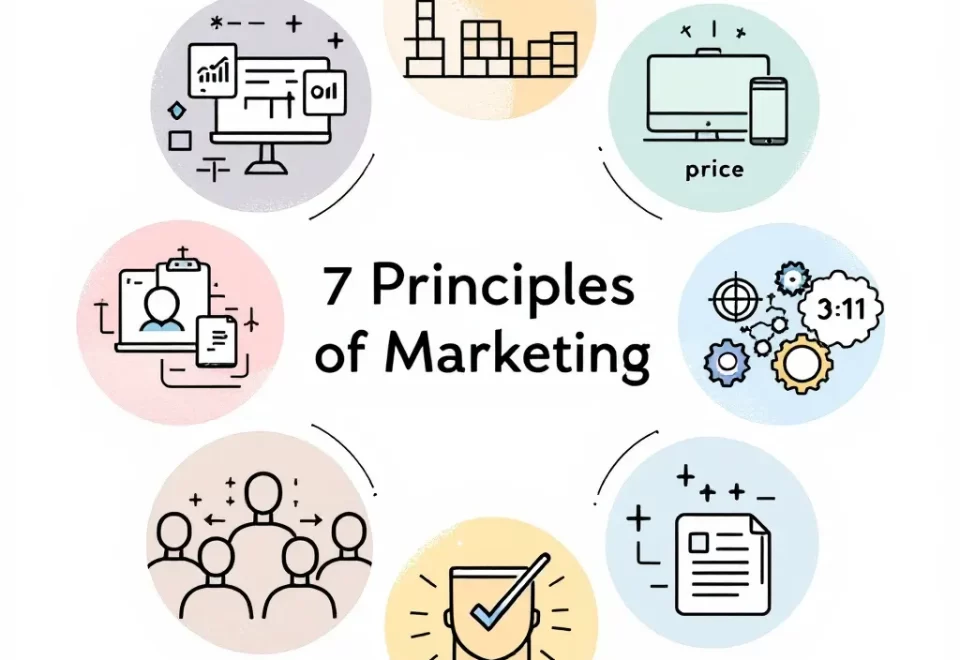Establishing a marketing strategy is vital for new businesses aiming to make their mark in the market. A crafted plan sets objectives, pinpoints the right audience, and manages resources efficiently, guaranteeing that your startup doesn’t blend in but shines as a distinctive brand. This handbook will outline the stages of crafting a winning marketing strategy for startups.
Understanding Your Target Market
Conducting Market Research
Before delving into marketing strategies, it’s crucial to grasp the landscape of the market. Begin by identifying your target audience who they are, what they need, and where you can connect with them. Equally significant is evaluating your competitors to understand their strengths and weaknesses. This analysis will shape your approach. Enable you to discover ways to set your brand apart.
Defining Market Segmentation
Segmenting your market allows you to customize your marketing initiatives for groups. For businesses, this could involve categorizing your audience based on demographics (such as age, gender, and income) or behaviors (like buying patterns and loyalty to brands). Effective segmentation ensures that your communications resonate deeply with the requirements of each segment.
Establishing Market Positioning
Your market positioning dictates how you aim for consumers to perceive your brand compared to rivals. This is where your Unique Value Proposition (UVP) comes into play what sets and enhances the appeal of your product or service? Creating a UVP and competitive edge is essential for making a mark in a marketplace.
Establishing Clear Marketing Objectives
Utilizing the SMART Goal-Setting Approach
When defining objectives, employing the SMART approach (Specific, Measurable, Achievable, Relevant, Time-bound) proves to be an effective technique. For example, instead of a vague goal like “boost sales,” a SMART objective would be “enhance sales by 20% within the next six months through targeted social media initiatives and monitoring engagement metrics such as customer feedback and response rates, potentially including tactics like analyzing or ‘spying on text messages‘ to gain deeper insights into customer behavior.”
Short-Term versus Long-Term Objectives
Maintaining a balance between achievements and sustainable growth is crucial for enterprises. While quick victories such as a product launch or a viral marketing campaign are long-lasting growth strategies, like fostering brand loyalty or expanding market presence, are what will ensure the enduring success of your startup.
Marketing Budgeting Strategies
Smart Allocation of Resources
New businesses often face constraints, so it’s important to invest funds in the impactful areas. Prioritize cost-efficient approaches such as leveraging social media platforms, which have the potential for returns with a modest budget. Exercise caution when exploring methods—start with small-scale initiatives to gauge their effectiveness.
Making Data-Driven Marketing Decisions
Assessing the return on investment (ROI) of your marketing efforts is crucial for optimizing budget utilization. Monitor the performance of campaigns. Adjust resource allocation to maximize ROI based on outcomes.
Ready to kickstart your startup’s success with a well-crafted marketing plan?
Contact Growth Hackers
Choosing the Right Marketing Channels
Digital Marketing Channels
In today’s digital age, online channels are often the most effective way to reach your audience. Social media marketing, content marketing, email campaigns, and PPC advertising are all powerful tools. Each channel has its strengths—social media is great for engagement, while PPC can drive immediate traffic to your site.
Traditional Marketing Channels
While digital marketing is essential, don’t overlook traditional channels. Print advertising, attending networking events, and even direct mail can still be effective, depending on your audience. The key is to know where your customers are and how they prefer to receive information.
Omnichannel Marketing
An omnichannel approach integrates both online and offline marketing efforts to provide a seamless customer experience. For example, a customer might first encounter your brand through an Instagram ad and later receive a direct mail piece reinforcing the same message. This integrated approach ensures consistent messaging and maximizes the chances of conversion.
Content Marketing Strategy
Creating Valuable Content
Content is king in marketing, and providing valuable, relevant content is essential for attracting and retaining customers. This can include blog posts, videos, infographics, and more. The goal is to position your startup as an authority in your field and to provide content that helps solve your audience’s problems.
SEO Optimization
Search engine optimization is critical for making sure your content is discoverable. Start with thorough keyword research to find the terms your audience is searching for, then optimize your content for these keywords. On-page SEO (like meta tags and content structure) and off-page SEO (like backlinks) both play important roles in improving your search engine rankings.
Building a Social Media Presence
Selecting the Right Platforms
Not all social media platforms are created equal—each has a different user base and different strengths. Choose the platforms where your target audience is most active. For example, if you’re targeting young adults, Instagram and TikTok might be better platforms than LinkedIn.
Engagement and Community Building
Social media isn’t just about broadcasting your message—it’s about building relationships. Engage with your audience by responding to comments, hosting live Q&A sessions, and running contests or campaigns that encourage user participation. The more engaged your audience is, the more likely they are to become loyal customers.
Email Marketing Campaigns
Building an Email List
An email list is one of the most valuable assets a startup can have. Encourage website visitors to subscribe by offering incentives like discounts or exclusive content. Make sure your signup process is simple and straightforward to avoid losing potential subscribers.
Designing Effective Email Campaigns
Crafting compelling subject lines and personalizing your emails can significantly improve open and click-through rates. Segmenting your list based on customer behavior or preferences allows you to send more targeted and relevant messages, which can increase engagement and conversions.
Influencer and Affiliate Marketing
Utilizing Influencers
For startups leveraging influencers in marketing campaigns can yield results, especially when partnering with influencers who resonate with your brand values. It’s essential to collaborate with influencers who have a rapport with their followers, as this authenticity can enhance the effectiveness of activities.
Affiliate Marketing Strategies
Implementing an affiliate program is an approach to expanding your audience reach while only investing in outcomes. Affiliates are responsible for promoting your products or services. Receive a percentage of sales they drive. This performance driven approach offers a cost method to expand your marketing initiatives.
Monitoring and Analytics
Tracking Key Performance Indicators (KPIs)
To understand how well your marketing plan is working, you need to track key performance indicators (KPIs). Important KPIs for startups might include customer acquisition cost (CAC), conversion rates, and customer lifetime value (CLV). Tools like Google Analytics can provide insights into how your campaigns are performing.
Adjusting Strategy Based on Data
Marketing is an ongoing process, and your strategy should evolve based on what the data tells you. A/B testing different approaches and making iterative improvements can lead to better results over time. Be prepared to pivot if certain tactics aren’t delivering the expected results.
Customer Feedback and Improvement
Gathering Customer Feedback
Your customers are a valuable source of information—don’t be afraid to ask for their feedback. Surveys, feedback forms, and social media listening can all help you understand what’s working and what needs improvement.
Implementing Feedback
Acting on customer feedback shows that you value their input and are committed to improving their experience. This can lead to higher customer satisfaction, stronger loyalty, and better word-of-mouth marketing.
Expanding Your Marketing Strategies
Streamlining Marketing Operations
As your business grows, utilizing marketing automation tools can help save time and enhance productivity. Platforms such as HubSpot or Mailchimp enable the automation of tasks, like email marketing, social media scheduling, and managing customer relationships allowing you to concentrate on planning.
Venturing into Markets
After establishing a presence in your initial market, it might be beneficial to explore expansion opportunities. This could entail entering regions or targeting a different demographic. Scaling up your marketing endeavors necessitates planning to maintain brand consistency and ensure the effectiveness of your campaigns.
Why is a marketing plan important for startups?
A marketing plan is important for startups because it provides a clear roadmap for achieving business goals. It helps define target audiences, set measurable objectives, and allocate resources efficiently. With a well-crafted marketing plan, startups can differentiate their brand, attract customers, and compete effectively in the market. It also guides decision-making, ensuring that all marketing efforts are aligned with the company’s overall strategy. By having a structured plan, startups can track progress, adjust tactics as needed, and ultimately increase their chances of long-term success.
How should I understand my target market?
To understand your target market, start by conducting thorough market research. Identify who your potential customers are by analyzing demographics such as age, gender, income, and location. Look into their behaviors, preferences, and pain points to understand what they need and how they make purchasing decisions. Additionally, study your competitors to see who they are targeting and how they are positioning their products or services. Gathering insights from customer surveys, focus groups, and online analytics can also help you gain a deeper understanding of your target market. This knowledge will enable you to tailor your marketing strategies effectively.
What is market segmentation, and why is it important?
Market segmentation is the process of dividing a broad target market into smaller, more defined groups based on specific characteristics such as demographics, behaviors, needs, or interests. Each segment consists of customers who share similar traits, making it easier to tailor marketing efforts to meet their specific needs.
Market segmentation is important because it allows businesses to create more personalized and effective marketing strategies. By focusing on distinct segments, companies can develop targeted campaigns that resonate more deeply with each group, leading to higher engagement, better customer satisfaction, and, ultimately, increased sales and loyalty.
What is the SMART goal-setting approach?
The SMART goal-setting approach is a method used to create clear, actionable, and achievable goals. SMART stands for:
- Specific: Define the goal clearly and precisely.
- Measurable: Establish criteria to track progress and measure success.
- Achievable: Ensure the goal is realistic and attainable given the resources available.
- Relevant: Align the goal with broader business objectives or personal priorities.
- Time-bound: Set a deadline or timeframe for achieving the goal.
Using the SMART approach helps ensure that goals are well-structured, focused, and more likely to be accomplished.
Closing Thoughts on How to Create a Marketing Plan for Startups
Creating a marketing plan for your startup is no small feat, but it’s an essential step in building a successful business. By understanding your market, setting clear goals, and choosing the right channels, you can create a plan that drives growth and positions your startup for long-term success. Remember, a marketing plan is not static—it should evolve as your business grows and the market changes.
Growth Hackers delivers top-notch B2B marketing services helping businesses from all over the world grow. There is no fluff with Growth Hackers. We help entrepreneurs and business owners craft a winning marketing plan that drives growth, increase their productivity, generate qualified leads, optimize their conversion rate, gather and analyze data analytics, acquire and retain users and increase sales. We go further than brand awareness and exposure. We make sure that the strategies we implement move the needle so your business grow, strive and succeed. If you too want your business to reach new heights, contact Growth Hackers today so we can discuss about your brand and create a custom growth plan for you. You’re just one click away to skyrocket your business.








